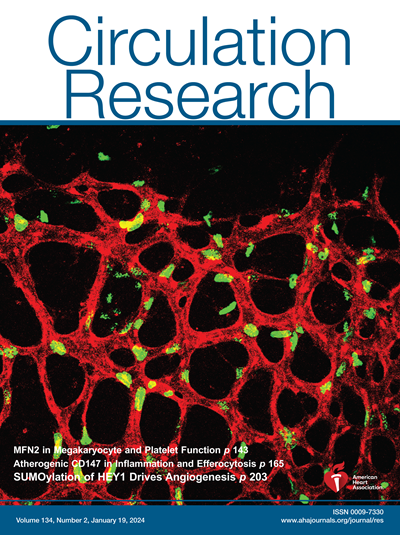CAR巨噬细胞在体内工程化减轻心肌缺血再灌注损伤。
IF 16.2
1区 医学
Q1 CARDIAC & CARDIOVASCULAR SYSTEMS
引用次数: 0
摘要
背景心肌缺血再灌注(I/R)损伤引起心肌纤维化,损害心功能和电传导,但目前的临床选择仍然不足。为了解决这一未满足的需求,我们探索了巨噬细胞靶向脂质纳米颗粒(LNPs)包裹FAP CAR (FAP[成纤维细胞活化蛋白]靶向嵌合抗原受体)mRNA,用于体内生成FAP CAR巨噬细胞,并评估了它们在减少心肌纤维化和改善心肌I/R损伤后心功能方面的治疗潜力。方法配制1,2-二油基- asn -甘油-3-磷酸-l-丝氨酸掺杂ALC-0315(一种可电离脂质)LNP,传递FAP CAR mRNA,生成FAP CAR巨噬细胞。该平台首先在体外通过评估巨噬细胞吞噬过表达fap的成纤维细胞进行验证。为了在体内进行评估,对I/R损伤的C57BL/6J小鼠静脉给予PBS、对照LNPs或LNP-FAP CAR (LNPs封装编码fap靶向CAR的mRNA)。综合分析包括跟踪产生的FAP CAR巨噬细胞的生物分布,定量测量纤维化减少,超声心动图评估心功能,以及安全性评估。结果slnp -FAP CAR成功生成功能性FAP CAR巨噬细胞,并在体外对FAP阳性成纤维细胞表现出吞噬能力。体内研究表明,静脉给药LNP-FAP CAR可在I/R小鼠心脏中产生功能性FAP CAR巨噬细胞,这些巨噬细胞选择性地参与并吞噬活化的心脏成纤维细胞。这种靶向细胞清除转化为活化的心脏成纤维细胞数量和心肌纤维化程度的显着减少,以及心功能的显着改善,而没有检测到毒性。值得注意的是,即使在i /R后延迟干预长达2周,这些效果也可以实现。结论我们的研究表明,LNP-FAP CAR治疗在体内产生的FAP CAR巨噬细胞可有效减轻I/R损伤后的心脏纤维化,改善心脏功能,且具有持久的益处,未观察到毒性。这种安全且适应性强的平台为心肌I/R损伤提供了一种有前景的治疗策略,并具有治疗其他纤维化心脏病的潜力。本文章由计算机程序翻译,如有差异,请以英文原文为准。
CAR Macrophages Engineered In Vivo for Attenuating Myocardial Ischemia-Reperfusion Injury.
BACKGROUND
Myocardial ischemia-reperfusion (I/R) injury induces myocardial fibrosis that compromises cardiac function and electrical conduction, yet current clinical options remain inadequate. To address this unmet need, we explored macrophage-targeted lipid nanoparticles (LNPs) encapsulating FAP CAR (FAP [fibroblast activation protein]-targeted chimeric antigen receptor) mRNA for in vivo generation of FAP CAR macrophages and evaluated their therapeutic potential in reducing myocardial fibrosis and improving cardiac function after myocardial I/R injury.
METHODS
We formulated 1,2-dioleoyl-sn-glycero-3-phospho-l-serine-doping ALC-0315 (an ionizable lipid) LNP to deliver FAP CAR mRNA to generate FAP CAR macrophages. The platform was first validated in vitro by assessing phagocytosis of FAP-overexpressing fibroblasts by these macrophages. For in vivo evaluation, C57BL/6J mice subjected to I/R injury received intravenous administration of PBS, control LNPs, or LNP-FAP CAR (LNPs encapsulating mRNA encoding a FAP-targeting CAR). Comprehensive analyses included tracking the biodistribution of the resultant FAP CAR macrophages, quantitative measurement of fibrosis reduction, assessment of cardiac function by echocardiography, and safety evaluations.
RESULTS
LNP-FAP CAR successfully generated functional FAP CAR macrophages that demonstrated phagocytosis ability toward FAP-positive fibroblasts in vitro. In vivo studies revealed that intravenous delivery of LNP-FAP CAR generated functional FAP CAR macrophages that selectively engaged and phagocytosed activated cardiac fibroblasts in I/R mouse hearts. This targeted cell clearance translated to a significant reduction in the number of activated cardiac fibroblasts and the extent of myocardial fibrosis, as well as marked improvement in cardiac function without detectable toxicities. Notably, these effects were achievable even when intervention was delayed for up to 2 weeks post-I/R.
CONCLUSIONS
Our study demonstrates that FAP CAR macrophages generated in vivo by LNP-FAP CAR treatment effectively mitigate cardiac fibrosis and improve heart function after I/R injury, with lasting benefits and no observed toxicity. This safe and adaptable platform offers a promising treatment strategy for myocardial I/R injury and holds potential for treating other fibrotic heart diseases.
求助全文
通过发布文献求助,成功后即可免费获取论文全文。
去求助
来源期刊

Circulation research
医学-外周血管病
CiteScore
29.60
自引率
2.00%
发文量
535
审稿时长
3-6 weeks
期刊介绍:
Circulation Research is a peer-reviewed journal that serves as a forum for the highest quality research in basic cardiovascular biology. The journal publishes studies that utilize state-of-the-art approaches to investigate mechanisms of human disease, as well as translational and clinical research that provide fundamental insights into the basis of disease and the mechanism of therapies.
Circulation Research has a broad audience that includes clinical and academic cardiologists, basic cardiovascular scientists, physiologists, cellular and molecular biologists, and cardiovascular pharmacologists. The journal aims to advance the understanding of cardiovascular biology and disease by disseminating cutting-edge research to these diverse communities.
In terms of indexing, Circulation Research is included in several prominent scientific databases, including BIOSIS, CAB Abstracts, Chemical Abstracts, Current Contents, EMBASE, and MEDLINE. This ensures that the journal's articles are easily discoverable and accessible to researchers in the field.
Overall, Circulation Research is a reputable publication that attracts high-quality research and provides a platform for the dissemination of important findings in basic cardiovascular biology and its translational and clinical applications.
 求助内容:
求助内容: 应助结果提醒方式:
应助结果提醒方式:


